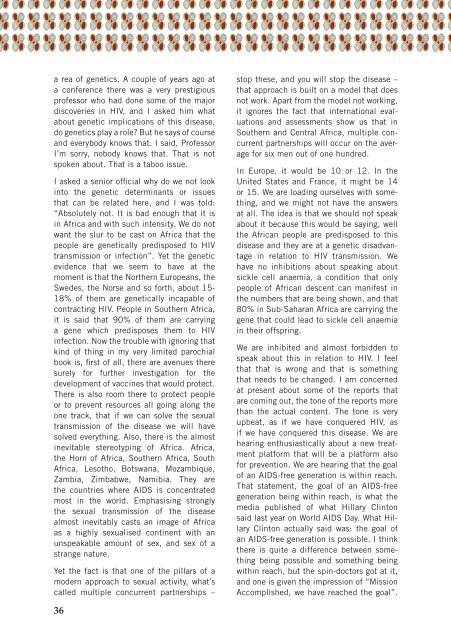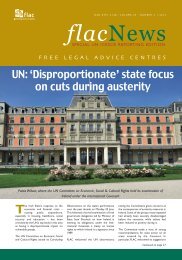HIV & AIDS-A Deep Human Concern
Create successful ePaper yourself
Turn your PDF publications into a flip-book with our unique Google optimized e-Paper software.
a rea of genetics. A couple of years ago at<br />
a conference there was a very prestigious<br />
professor who had done some of the major<br />
discoveries in <strong>HIV</strong>, and I asked him what<br />
about genetic implications of this disease,<br />
do genetics play a role? But he says of course<br />
and everybody knows that. I said, Professor<br />
I’m sorry, nobody knows that. That is not<br />
spoken about. That is a taboo issue.<br />
I asked a senior official why do we not look<br />
into the genetic determinants or issues<br />
that can be related here, and I was told:<br />
“Absolutely not. It is bad enough that it is<br />
in Africa and with such intensity. We do not<br />
want the slur to be cast on Africa that the<br />
people are genetically predisposed to <strong>HIV</strong><br />
transmission or infection”. Yet the genetic<br />
evidence that we seem to have at the<br />
moment is that the Northern Europeans, the<br />
Swedes, the Norse and so forth, about 15-<br />
18% of them are genetically incapable of<br />
contracting <strong>HIV</strong>. People in Southern Africa,<br />
it is said that 90% of them are carrying<br />
a gene which predisposes them to <strong>HIV</strong><br />
infection. Now the trouble with ignoring that<br />
kind of thing in my very limited parochial<br />
book is, first of all, there are avenues there<br />
surely for further investigation for the<br />
development of vaccines that would protect.<br />
There is also room there to protect people<br />
or to prevent resources all going along the<br />
one track, that if we can solve the sexual<br />
transmission of the disease we will have<br />
solved everything. Also, there is the almost<br />
inevitable stereotyping of Africa. Africa,<br />
the Horn of Africa, Southern Africa, South<br />
Africa, Lesotho, Botswana, Mozambique,<br />
Zambia, Zimbabwe, Namibia. They are<br />
the countries where <strong>AIDS</strong> is concentrated<br />
most in the world. Emphasising strongly<br />
the sexual transmission of the disease<br />
almost inevitably casts an image of Africa<br />
as a highly sexualised continent with an<br />
unspeakable amount of sex, and sex of a<br />
strange nature.<br />
Yet the fact is that one of the pillars of a<br />
modern approach to sexual activity, what’s<br />
called multiple concurrent partnerships –<br />
stop these, and you will stop the disease –<br />
that approach is built on a model that does<br />
not work. Apart from the model not working,<br />
it ignores the fact that international evaluations<br />
and assessments show us that in<br />
Southern and Central Africa, multiple concurrent<br />
partnerships will occur on the average<br />
for six men out of one hundred.<br />
In Europe, it would be 10 or 12. In the<br />
United States and France, it might be 14<br />
or 15. We are loading ourselves with something,<br />
and we might not have the answers<br />
at all. The idea is that we should not speak<br />
about it because this would be saying, well<br />
the African people are predisposed to this<br />
disease and they are at a genetic disadvantage<br />
in relation to <strong>HIV</strong> transmission. We<br />
have no inhibitions about speaking about<br />
sickle cell anaemia, a condition that only<br />
people of African descent can manifest in<br />
the numbers that are being shown, and that<br />
80% in Sub-Saharan Africa are carrying the<br />
gene that could lead to sickle cell anaemia<br />
in their offspring.<br />
We are inhibited and almost forbidden to<br />
speak about this in relation to <strong>HIV</strong>. I feel<br />
that that is wrong and that is something<br />
that needs to be changed. I am concerned<br />
at present about some of the reports that<br />
are coming out, the tone of the reports more<br />
than the actual content. The tone is very<br />
upbeat, as if we have conquered <strong>HIV</strong>, as<br />
if we have conquered this disease. We are<br />
hearing enthusiastically about a new treatment<br />
platform that will be a platform also<br />
for prevention. We are hearing that the goal<br />
of an <strong>AIDS</strong>-free generation is within reach.<br />
That statement, the goal of an <strong>AIDS</strong>-free<br />
generation being within reach, is what the<br />
media published of what Hillary Clinton<br />
said last year on World <strong>AIDS</strong> Day. What Hillary<br />
Clinton actually said was: the goal of<br />
an <strong>AIDS</strong>-free generation is possible. I think<br />
there is quite a difference between something<br />
being possible and something being<br />
within reach, but the spin-doctors got at it,<br />
and one is given the impression of “Mission<br />
Accomplished, we have reached the goal”.<br />
36





